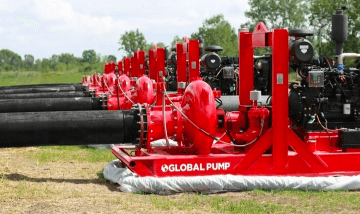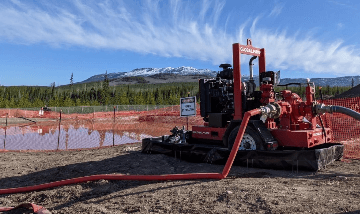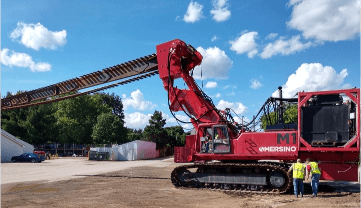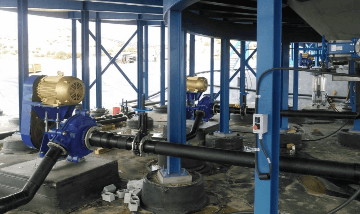Professional Dewatering Services
Global Pump produces superior pumps that can be employed on various projects, including emergency flood control, construction, dewatering, industrial applications, and more. Global Pump models are designed with state-of-the-art enclosed impellers that ensure high efficiencies (fuel savings) and extended component life due to lower wear rates.
Unlike competitor pumps, these factors provide savings that allow our pumps to pay for themselves. We also supply water pumps, slurry pumps, other pumps and pumping solutions.
Dewatering is the process used to remove ground or surface water from tunnels, construction sites, and more. It allows the soil to dry before excavation. Excess water is removed from the ground’s surface or underground, which firms the soil. When done right, dewatering will prevent upheaval failure and soil erosion.
The dewatering process can be accomplished in numerous ways. However, the easiest of all methods is the gravity drain approach. The water is carried away from the site using drainage channels to be handled at the discharge point.
Other dewatering methods are syphoning, water pumping, or utilizing construction machinery to pick up and cast aside water from a specified area. The general framework of dewatering follows a simple four-step process: The collection of water, the pumping of water, filtering the water to remove contaminants, and dispensing the water at the proper location.



At Inner City Diesel, we are your dependable source of dewatering and fluid management services. We sell, rent, rent-to-own, install, operate, and maintain pumps and pumping equipment. We are the Global Pump authorized dealer for Canada. Global produces superior pumping equipment designed to withstand unfavourable conditions in many applications.
Dewatering is pivotal in various industries, like mining and construction, where water presence can significantly impact operations.
Well-point dewatering is a highly effective method for managing groundwater levels in excavation projects, particularly in areas where soil stabilization is crucial. This process involves installing closely spaced vertical wells, known as well points, connected to a common header pipe. A vacuum pump then draws groundwater into the wells, lowering the water table and creating dry, stable conditions for construction.
Well-point systems are ideal for shallow excavations, while deeper projects may require multiple stages or deep well dewatering systems. The technique is especially beneficial for stabilizing soils with low permeability, such as silts or sandy silts, by reducing water content and increasing soil strength. Proper design and installation of well-point dewatering systems prevent issues like soil erosion and instability and improve the overall safety and efficiency of the construction process.
In the mining sector, managing water is a double-edged sword. Water is indispensable for numerous operational processes, but excess water can hinder mining activities. Effective mine dewatering strategies serve dual purposes: they not only facilitate the reclamation of process water for reuse, enhancing environmental sustainability and reducing costs but also ensure the removal of surplus water from mining pits.
Dewatering is crucial for uninterrupted excavation, ensuring worker safety, and maintaining high productivity levels. A well-thought-out, adaptable, and reliable dewatering plan is fundamental to providing a consistent supply of process water and managing excess water efficiently throughout mining operations.
In the construction industry, water is often viewed as a problematic element. Its presence can lead to damage, slow down production, and inflate costs, particularly on commercial and industrial building sites. Following rainstorms, construction sites frequently require dewatering to resume building activities promptly.
Effective construction site dewatering is vital for minimizing downtime and ensuring the timely progress of construction projects. By implementing robust dewatering techniques, construction sites can mitigate water-related challenges, safeguarding the structural integrity of ongoing projects and the financial investments involved.



A submersible dredge pump aids in the removal of silt build-up at marinas, harbours, dock loading facilities, and many more locations. They are also used to deal with many other situations, such as:
At ICD Group, our dewatering services and equipment demonstrate remarkable reliability, delivering durability and superior performance as crucial factors to keep your worksite safe and operable. We are conveniently based in Fort McMurray and Hinton in AB, Smithers and Sparwood in BC. For more information, call us at (587) 624-0828.